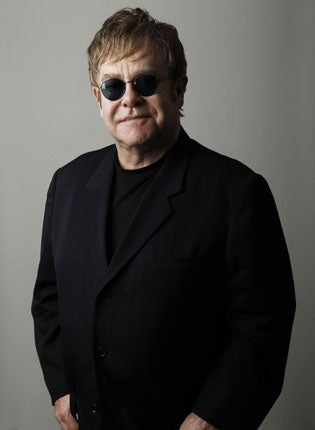Elton John tells world leaders: stop anti-gay discrimination

The leaders of all three main political parties in Britain are to throw their support behind a new international gay-rights group trying to combat homophobic discrimination in the Commonwealth.
Top UK music stars Elton John and George Michael have been invited to attend the official launch in the House of Commons of Kaleidoscope, which aims to get 19th-century British colonial anti-gay laws revoked in the Commonwealth and beyond, using business and political pressure.
It comes after campaigners grew increasingly concerned at how homosexual persecution is being actively encouraged by some Commonwealth states – particularly in Africa.
In January, a Ugandan gay rights campaigner was beaten to death after being "outed" by a local newspaper which published photographs of people that it said were gay with the headline: "Hang them."
Lesbians in South Africa have been murdered and subjected to violent attacks, including so-called "corrective rapes", while activists in Kenya and Ghana have also been targeted.
Currently, 38 of the 54 members of the Commonwealth criminalise homosexuality. Penalties include 25 years imprisonment in Trinidad and Tobago and 20 years plus flogging in Malaysia. Several countries, including Sierra Leone, Pakistan Tanzania and Bangladesh impose life imprisonment.
Kaleidoscope says while many countries have national gay rights organisations there is no overall international body which can coordinate action.
London has become the base for the new organisation, partly due to the Commonwealth link, but also because it is an international business hub.
The group wants large multi-nationals to pressure regimes to change laws, particularly in more developed Commonwealth countries like Singapore where homosexuality is illegal.
Nearly all the Commonwealth's anti-gay laws are a colonial legacy. They were introduced by Britain in the nineteenth century and never repealed when colonies won independence. Bisi Alimi, who became the first Nigerian to come out on national TV, is one of Kaleidoscope's founding members.
Yesterday he said: "As a result of coming out I was attacked, tied up and beaten in my own home in Lagos. For the first time in my life I not only saw a gun but I felt it right against my head. I was forced to leave my country.
"My dream is that others like me will be free to stay and be happy surrounded by the love of their friends and families."
Kaeleidoscope is supported by Prime Minister David Cameron and Deputy Prime Minister Nick Clegg, as well as by Labour leader Ed Miliband. Mr Cameron said: "In some countries, it's simply appalling how people can be treated – how their rights are trampled on and the prejudices, and even violence, they suffer. I want Britain to be a global beacon for reform."
Mr Miliband said: "I am proud to offer my support to Kaleidoscope to protect people from prejudice and persecution across the world."
Speaker of the House of Commons John Bercow has agreed to become Kaleidoscope's honorary president
Veteran broadcaster Paul Gambaccini, who has donated money to the charity, said: "It is time for those of us who enjoy our rights in the UK to support movements for dignity and decency wherever they are located."
PERSECUTION OF HOMOSEXUALS AROUND THE WORLD
EGYPT
Although not illegal, numerous cases have been brought against homosexuals in recent years. In 2004 a 27-year-old student was imprisoned for 17 years including 2 years hard labour for posting a personal profile on a gay dating site.
ZIMBABWE
The law states that any man performing anal sex is liable for a fine or imprisonment of up to a year. In 2006 a law was passed making it illegal for two people of the same sex to hold hands, hug, or kiss.
SINGAPORE
Homosexuality remains illegal between males under the country's Penal Code, punishable by up to two years in prison.
SUDAN
Thejudicial systemis based on the Shari'a and rules that same-sex sexuality activity is illegal and punishable by capital punishment. For homosexual men, lashes are given for the first offence, with the death penalty following the third offence.
BELARUS
Despite making homosexuality legal in 1994, households headed by same-sex couples are not eligible for legal protections available to opposite-sex couples.
Subscribe to Independent Premium to bookmark this article
Want to bookmark your favourite articles and stories to read or reference later? Start your Independent Premium subscription today.

Join our commenting forum
Join thought-provoking conversations, follow other Independent readers and see their replies